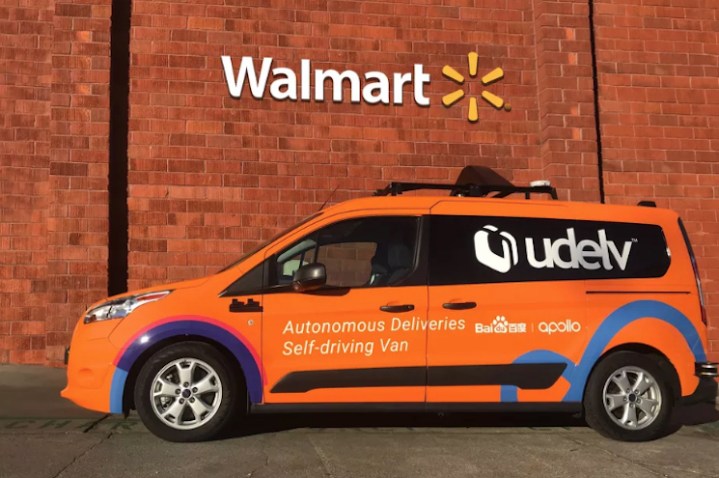
It was a year ago this month that San Francisco-based startup Udelv laid claim to the world’s first autonomous grocery delivery service on public roads after partnering with Draeger’s Market for a trial operation in San Mateo, California.
Since then it has signed a deal to use 10 of its autonomous delivery vans to transport orders to grocery store customers in Oklahoma City, Oklahoma. The service is set to launch this year.
Udelv’s ongoing efforts have now caught the eye of retail giant Walmart, with the pair teaming up to conduct trials of an autonomous grocery delivery service from this month in the city of Surprise, Arizona, just northwest of Phoenix. To use the service, Walmart customers simply order their groceries online as usual and if one of Udelv’s autonomous vehicles is available, it will tootle to the delivery address with a safety driver on board.
Udelv, which started out just two years ago, insists that robot delivery vehicles offer numerous benefits for shoppers. Such a service, it says, “can cut delivery costs, narrow delivery windows, and make more goods more accessible to more people, enabling customers to save time and live better.”
Udelv’s partnership with Walmart coincides with the launch of its second-generation self-driving delivery vehicle, the Newton (above). The shelving system inside the modified Ford Transit Connect has been redesigned so now it can carry 32 customer orders, up from 18. The vehicle’s autonomous technology has been improved, too, allowing it to reach speeds of 60 mph, though it’s not clear if it’s actually going to go that fast during its trial; the original design could only reach 25 mph.
Commenting on its work with Udelv, Walmart executive Tom Ward said, “We’re still learning — it’s a pilot — but we want to make sure we stay on the cutting edge of grocery delivery by exploring what’s new and next.”
Plenty of interest
Walmart certainly appears keen to learn as much as possible about robot grocery delivery, partnering as it has done with companies that include not only Udelv, but also Ford and Waymo, two major players in the field of autonomous-vehicle technology.
Udelv is also competing with lesser known outfits such as Nuro, which has been making significant strides in the same space. In the summer of 2018, the Mountain View, California-based startup partnered with supermarket giant Kroger for autonomous grocery deliveries to customers in Scottsdale, Arizona.
At the outset, Nuro’s service used self-driving Prius hybrids, but last month the company began using an unmanned autonomous delivery pod that’s monitored remotely.
There’s clearly a lot of jostling for position in the last-mile robot delivery market just now, with plenty of partnerships being struck between big retail firms and technology companies as each one searches for the best solution. With that in mind, we can expect to see some significant developments in 2019.


